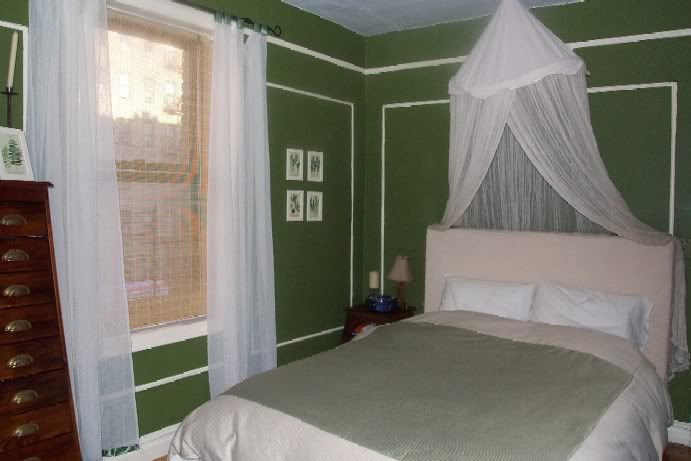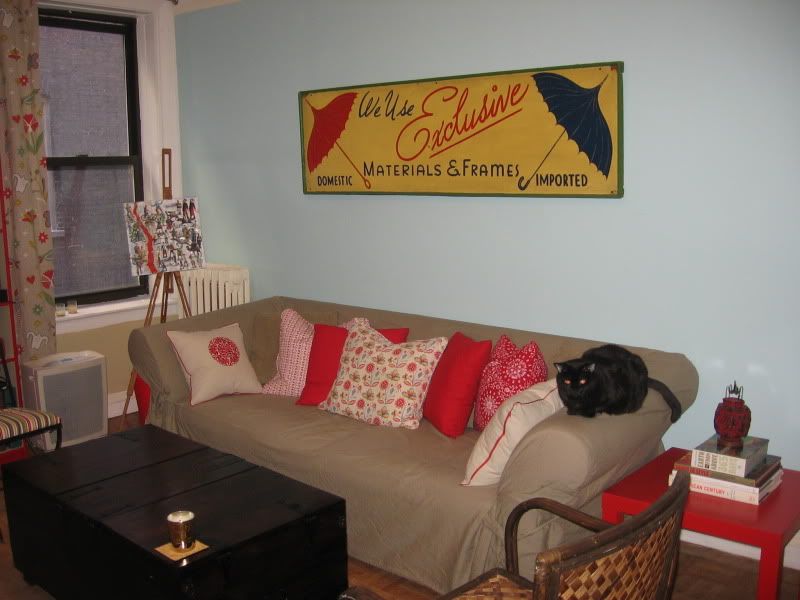Telling my friends and family about James’ departure was the first hurdle I had to overcome in fully extricating him from my life. Signing my divorce papers was the second, and finding a new apartment was the third and final major step I had to take, and when the time came it was a task I relished. Moving to Queens in December 2007 was bittersweet. While I was excited to set up house with my new husband in a place that we’d picked out together, I knew I would miss my old apartment, and perhaps more importantly I would lose my long-standing identity as a Manhattanite.
Just before I officially moved to New York City (after college in 2001), I spent a weekend hunting for a place to live on the magical island of Manhattan. It was a whirlwind two days touring neighborhoods with which I was not yet familiar, popping into internet cafes to check the Village Voice listings (this was a pre-craigslist era, after all), reading e-mails from prospective roommates, and stopping into various restaurants to find nourishment and a place to rest my weary feet.
After two days of looking, I’d narrowed my choices down to three apartments. One was a tiny two bedroom above a Chinese fish market in the neighborhood the young, blond male professional lease-holder had advertised as Little Italy. Aside from the close quarters, I wasn’t sure my vegetarian olfactory nerves were ready to face the pungent smell of seafood every day. Next was a warm, nicely decorated apartment with a seemingly friendly girl outside Tomkins Square Park in a neighborhood I had been warned was a bit seedy. Or maybe I was just thinking of the two girls from Ronkonkoma in the movie 200 Cigarettes who were told never to go east of Avenue A. In any case, the vagrants in the park made me a bit wary. Last was a modern high-rise apartment in Midtown with a tennis instructor who seemed a bit too old to be recruiting a twenty-two year old female as a roommate. I think even then I sensed that this apartment’s proximity to Times Square would over time become an annoyance.
Exhausted and hungry, with the sun setting on my weekend in New York, I debated ditching my last appointment of the day and settling on one of the places I’d seen. Instead, I gathered up my last reserves of energy and headed out to 28th Street to view that final listing. The building housed a restaurant on the ground floor and was walking distance from my new office.
The neighborhood, I came to learn, was called Rose Hill. It is a small area sandwiched between Murray Hill to the north, and Gramercy to the south. On the maps inside taxi cabs, it is not identified or brightly color-coded like the rest of the city, so it is known to some as “the grey box.” Others, because of its abundance of Indian restaurants (and the scent permeating the air), call it affectionately “Curry Hill,” a play on the name of the neighborhood to the north.
Upon reaching the second floor of the walk-up, I was greeted at by a short guy with spiky hair. He immediately welcomed me in to what, compared to the closets I’d viewed all weekend, seemed like a palace. The apartment was on two levels, and after offering me a cocktail, my host Joey showed me around.
On the first floor was the kitchen (with a dishwasher!) that opened up to a large living room (with a working fireplace!). Off the living room was a small powder room and beyond it was a nicely furnished balcony. The stair led up from the living room to the second floor where there were four bedrooms and two bathrooms (one with a washer and dryer in it!). Joey’s bedroom even had a ladder that pulled down to allow access to the roof.
The room I would be renting was small, but given the spacious common areas, it was adequate. Joey took me out to the balcony and described the other tenants: two twenty-something women, one who worked at a fashion magazine and another who was a Greek model from Australia. Joey worked in the commercial production and film industries as a camera man.
~ The living room on 28th street, after I'd painted ~
I was dazzled by the prospects of this living situation and the glamorous careers of the roommates. As we chatted, I peered over the balcony at the street below and tried to imagine my life in this apartment. It was late at this point, and when Joey asked if I was hungry I realized I was actually famished. We walked to the Mexican joint down the street, and when he insisted on picking up my burrito tab, I knew the decision to move in was in my hands. And so on September 1st, 2001, I did.
The two girls ended up moving out shortly after September 11th, and were replaced by two guys. The four of us had a good run as roommates for about a year, throwing parties, watching movies, and just generally enjoying each other’s company. I sometimes compared living with those three guys, with all of our friends cycling through, to living in a fraternity house. But I enjoyed every minute of it. When the two guys moved out and were replaced by a new set of roommates, it seemed like the end of an era.
Throughout this time I was romantically involved with Joey, a relationship that grew increasingly strained as his depression stemming from the terrorist attacks began to take over his life. By the spring of 2003, deeply unhappy with the way thing with Joey were going, I made the difficult decision to move out. While he was away promoting a movie he had worked on, I began looking for a new place to live.
I don’t remember much about my second foray into New York City real estate, but perhaps that is because I located a new apartment with relative ease. I had grown accustomed to the square footage of my old place, so was pleased when I found a good sized two bedroom apartment that was within my budget. No longer a wide-eyed recent college-grad, I was not afraid of this apartment’s Harlem address. My two former roommates had also paved the way for me, having each moved about a hundred blocks north of our shared 28th Street apartment.
My new bachelorette pad was in a neighborhood of Harlem called Sugar Hill, whose name derived from the moneyed residents who enjoyed the “sweet life” there during the Harlem Renaissance of the 1920s, while looking down the hill to the east at the poorer residents below. Pre-war buildings lined the street and a few blocks away was a little jazz club where luminaries like Wynton Marsalis, Olu Dara, Savion Glover and even Stevie Wonder were known to drop in for a jam session. I could walk to Yankee Stadium, just across the river in the Bronx, if the mood to watch some baseball struck.
~ The bed I built in my Harlem apartment ~
I was excited that for the first time in my life I would be living on my own. Sure, I had a single for three semesters in college, but never before had I had a bathroom all to myself or the ability to walk the halls in the nude, should I so desire (well, I suppose the guys in the dorm might not have minded, but I would have!). I moved quickly to buy furniture to fill the place and even designed, built and upholstered some of the pieces myself. Having a spare room meant I could house out-of-town guests, as infrequent as they might be, or even rent it out to those seeking temporary housing. In time I developed a roster of rag-tag roommates, and had begun to refer to my apartment as “Katie’s Home for Wayward Children.”
The weekend after I moved in, I set out to take a stroll around my new neighborhood, to get a lay of the land. It happened to be Mother’s Day, and I’d never seen such commitment to the holiday. Every male on the street was carrying something to bestow upon his mother, or perhaps the mother of his children. Helium balloons, flowers, stuffed animals, and those oversized greeting cards could be seen up and down the avenues of Sugar Hill. Everyone was dressed in their Sunday finest, and the mood was overwhelmingly jovial.
As I walked, I was exposed for the first time to the running commentary from the peanut gallery of those loitering on the street. I smiled at one man, flowers in hand, when he wished me a happy Mother’s Day. I then giggled to myself, however, when after he’d passed me, he called over his shoulder “And if you’re not a mother yet, I’d be happy to make you one!”
Later on in my stroll, I approached a guy who was washing his car in the street. He looked up from his chore as I passed and greeted me with the line, said rather incredulously, “Hey there… white lady.” Thinking of his cadence and tenor in saying that one line still makes me laugh today.
In the years that I lived in Harlem, I never found these comments to be akin to the catcalls of a construction worker, nor did I ever feel threatened by my observers. Rather, I felt that they were in a way looking out for me and appreciative of my presence in their neighborhood. As there were residents on the street most hours of the day, I took comfort in knowing that if something were to happen to me, there were people around to intervene.
So what were the people doing out on the street all hours of the day and night? There were the young girls playing Double Dutch and the old men playing dominoes or spades. There were the teens smoking weed, flirting and shooting Cee-lo against the stoops. In the summer there were families barbecuing in halved fifty gallon drums while the children ran through the fire hydrants. They listened to their music from boom boxes plugged into lampposts or from the stereo of a car with its doors left open. It may sound stereotypical, but these were the people in my neighborhood, the people that I met each day.
Or didn’t meet, as was more accurately the case. While I never learned any of their names, I would take note of all the people who I observed each morning on my way to the subway: my gay neighbor whose derrière, enhanced by too-tight slacks, wiggled in front of me as we walked, the white, bohemian mother taking her uniformed multi-racial son to school; the overweight super who inexplicably wore sleeveless mesh shirts to sweep in front of the building in his charge; the tidy businessman who lived in the stand-alone house next to the former Bailey (of Barnum and Bailey fame) residence, who kept his white sedan impeccably clean; the dreadlocked fellow festooned in an ever changing array of Rastafarian hats; the Mennonite and Mormon missionaries; and finally the pair of old men who talked about their dogs while leaning on the fence outside the grocery store adjacent to the train station.
I had discovered that contrary to my family’s initial concern, the neighborhood was in fact extremely safe. St. Nicholas Avenue, the street I called home, was primarily residential, so the only foot traffic consisted of people going to and from their homes (and those loitering outside theirs). Absent were the transient drunks, pan-handlers and hookers that frequented 28th Street. Because of my limited housing budget, I was an inadvertent pioneer in the gentrification of this historically black neighborhood (gentrification is probably not the correct term given my economic status, perhaps “white-washing” is more apropos. In the years I lived there, many downtown chain establishments moved in, including a Duane Reade drug store, a New York Sports Club, and yes, even a Starbucks).
The two ladies who lived in the ground floor apartments flanking the elevator in my building took a keen interest in this new white interloper, and seemed to make it their mission to look out for me. They had dubbed themselves the President and Vice President of the Tenants’ Association, and in those roles monitored the comings and goings of the building. The would caution me to be careful when they saw me stumbling in after a night at the bars, encouraged me to attend the building’s Christmas party and informed me of their ongoing disputes with the management company. They also signed for my packages, which I appreciated, as it saved me a ten block walk to the post office.
My favorite anecdote to recount to those who question Harlem’s safety as a habitat for a pasty white girl occurred one snowy evening around Christmastime. I returned home in a taxi late at night after my company’s holiday party downtown. I was bundled in my winter coat and was laden with parcels filled with Christmas gifts. After paying the driver, I stuck my wallet under my arm and fumbled in my purse for my keys before exiting the cab and heading up to my apartment (any street savvy city girl knows you don’t want to be caught unawares by your front door searching for your keys).
The next morning, having overslept following the previous night’s festivities, I couldn’t immediately locate my wallet, so rushed out the door assuming I’d find it later in one of the shopping bags I’d been carrying. Upon returning home from work that evening, I looked for my wallet with no luck. I hesitated to cancel my credit cards because I knew I’d had it the night before so figured it must be around the apartment somewhere, especially since no charges had shown up on the missing cards. Calls to the taxi lost-and-found line the next day were fruitless, and I headed home from the office prepared for an evening on the phone with Mr. Visa and Ms. Master Card.
Trudging up the stairs to the elevator, I bumped into the self-proclaimed Association President.
“Girl, I’ve been looking for you!” she said. “Where’ve you been?”
I mumbled something about being busy with the holidays. She replied, to my surprise, “I’ve got your wallet!”
She then recounted how a woman in the next building over had found my wallet in a snow bank by the curb while shoveling out her car. Knowing I didn’t live in her building, she asked my neighbor if she recognized the face on my driver’s license. Being the busy-body she is, of course she did! She handed me back my billfold, and I opened it up to find its contents intact. If I had dropped my wallet on 28th Street, it would have quickly become the property of some passer-by, and I likely would have had to dispute ungodly fraudulent charges on my credit cards.
“Sometimes it’s good to be the only white girl in Sugar Hill,” I thought.
Needless to say, I was happy in Harlem. I had become an uptown girl, living in my uptown world. In 2006, a few months after I started dating James I renewed my lease, signing on to a fourth year in my apartment. Following his graduation that year, James moved in with me. We had debated the merits of cohabitating versus James setting up his own place. In retrospect, he probably would have been better off living on his own for a while to gain some responsibility and independence, but at the time we were spending every night together so the practicality of living together (transit time, financial savings, not having to transport toothbrushes and underwear, etc.) seemed obvious.
When James moved in he brought with him little more than his clothing, a Don Mattingly bobble head and a wok. I tried to make the apartment as welcoming as possible for him, proudly framing and displaying Jamie’s most recent class photo. But there was no getting past the fact that the apartment had been mine and not ours, so after we were married it was clear we should move in to a place that we selected together. Upon returning from our honeymoon, we began searching in earnest.
We compared our requirements for a new place. My ideal living situation would have two bedrooms, laundry in the unit, a dishwasher, and an outdoor space. I of course would have preferred to stay in Manhattan, but to have the amenities I desired, I didn’t mind living in Brooklyn, Queens or New Jersey, as long as it was near public transportation.
James would only consider living in Long Island or certain parts of Queens (the two areas where he grew up). He also wanted a parking spot off the street, ideally room for a pool table, and most importantly to be closer to his job. James had spent the year and a half we’d been together commuting by car, first to his college more than an hour and a half away in Stony Brook, and later to his work, about 45 minutes from Harlem. While my subway commute was also 45 minutes from home to work, he held a grudge about all the time he’d spent driving out to his classes. He felt it was a sacrifice I had not matched and did not appreciate (he somehow conveniently forgot all the weekends I would take the Long Island Rail Road to meet him at his weekend bartending job). He insinuated that it was my turn to sacrifice when it came to our living situation, so I let him filter the apartment listings based on locations he deemed acceptable. I was in newlywed bliss, and the thought of setting up our idyllic semi-suburban life charmed me.
~ Whitestone Apartment ~
After a few weeks of online apartment hunting, we set out to see some places in person. And that is how after looking at only three apartments, I found myself in Whitestone, Queens agreeing to sign a lease on an apartment in a house on a residential street further east than I’d ever ventured in that borough. Whitestone is a racially mixed area in the north east corner of Queens, past Shea Stadium and past La Guardia. The landmarks in the neighborhood are the New York Times printing plant and the shopping center containing a Target and a Costco. It was worth it to live in this pseudo-suburbia, I told myself, as I began to envision myself as the happy homemaker.
~ James' pool table ~
The apartment had two big bedrooms, a dining area, a linen closet, and even an attic. It had an open floor plan, new windows, a full-size fridge, a washer and dryer, counter space and built-in air conditioning in the living room (the last item turned out to be invaluable because James had been too lazy to help remove my fancy A/C unit from the bedroom window when we moved out of Harlem). There was a living room and a dining area, allowing James to get the pool table he wanted. Outside there was a private driveway and garage and not only a balcony but a backyard to boot! I didn’t get the dishwasher I wanted, but James promised he would make up for that by taking care of the dishes (which turned out to not be the case and would later be a huge point of contention).
The other downfall was the new apartment was not near the subway. While James’ commute was cut to five minutes, mine was effectively doubled. I was required to take a bus ride to the extremely busy 7 train terminal in Flushing, ride the entire length of its track, oftentimes standing up the entire way, to Times Square (which I have already mentioned I detest) and transfer to the 1 train heading downtown to my TriBeCa office. James shaved about 15 minutes off my trip most mornings by driving me to the train on his way to work, but when he had an early meeting and of course after he moved out, my door-to-door trip was an hour and a half, twice a day, five days a week.
If I stayed out late at night with friends in the city, I could end up in Flushing waiting in the cold for a bus for thirty minutes rather than take the twenty minute walk home. The streets in the area were not well lit, and for whatever reason I never felt as safe walking them as I had in Harlem. Some nights I would get so frustrated waiting there, I would call James to pick me up, but I don’t recall him ever coming as he would either be out somewhere with his friends and not want to leave or the bus would happen to come just as I was calling. On these late nights I tried to remind myself that it had been worth it to hang out with my friends in the city, but was intensely jealous that they all had been whisked home in ten minute taxicab rides to their husbands’ loving arms while I was still endeavoring to get home two hours after we’d parted ways.
When I was actually at home, however, I was generally content. At Christmas we joyfully decorated a tree and strung lights on the front porch. We prepared a New Year’s feast for a group of friends and included James’ mother. I channeled Martha Stewart when setting the table that night, laying a table cloth over our pool table’s ping pong surface, placing the dishes on chargers, arranging a festive centerpiece, lighting candles and setting each place with one of those old-fashioned poppers (as my grandmother always does).

~ My Garden ~
When spring rolled around, I planted flowers, herbs and vegetables in the back yard. I enjoyed watching the earthworms, absent in Manhattan, aerating the soil in my bit of earth. We hosted regular backyard barbecues for our friends on the weekends. James would mow the lawn, a chore that after he left I had to take on for the first time in my life. (It wasn’t as bad as I thought it would be.) James would often cook dinner for me, as he’d promised in his wedding vows, usually a vegetarian stir-fry of some sort.
On the surface it must have seemed like a charmed life. I surely wanted it to be, but I was short one picket fence and one loving husband. When James left, the house felt haunted by his presence. I spent many nights on the sofa, not wanting to retire to our marital bed. I looked around the apartment’s bare walls and realized I’d never hung up any of my art. More shockingly, I had not displayed in the bathroom any of my extensive rubber duck collection, perhaps the most “me” decoration there is.
Maybe I didn’t want to make my presence overtly felt, to ensure he felt that this was “our” place. Maybe I grew to busy tending to my new husband or too complacent in my new life to make the effort. Or maybe I knew deep down that my stay there would not be long enough to warrant putting everything up only to take it down again.
Whatever the reason, upon his departure I ventured up in to the attic to swap out James’ possessions for my stowed décor and displayed them around the house. It comforted me somewhat to see my things around me and knowing that there was an definite expiration date on my lease helped get me through those months.
This time when I set out to find a new apartment, Craig and his list were not too kind. Despite the housing bubble having supposedly burst, my budget for a rental was equal to, if not less than, that with which I set out to find an apartment in 2003. Plus I had two cats, so my future landlord had to be amenable to that. I looked at apartments in western Queens, despite my newfound distaste for that borough, but found nothing. Brooklyn had been overrun by privileged hipsters and I was priced out of that borough. Many of the apartments in New Jersey I saw were in seedy areas or required a bus ride in addition to a train trip, and I had grown allergic to the concept of commuting on buses. The apartments that were near the train were generally linoleum-clad basement dwellings that appeared likely to have been previously inhabited by a middle aged serial killer. So Jersey, it seemed, was out. I toyed with the idea of looking in the Bronx, but even there found little of interest.
Deep down, I wanted to move back to Manhattan anyhow, with all of its beautiful wood-floored pre-war buildings and city-so-nice-they-named-it-twice mailing addresses. The gentrification of Harlem that I had been a part of all those years prior was now pretty much complete, and the same apartment I lived in before would have rented for at least fifty percent more than I had been paying. I found that the line above which I could afford apartments had moved about fifty blocks north. I kicked myself for giving up my old bachelorette pad.
I looked at about a dozen places before finding the perfect place. Or at least it was perfect given the circumstances. I would be downsizing to a one bedroom unit, but it had several closets and was a decent size. It had interesting moldings and windows in every room. A previous tenant had installed some mirrors on the walls of the foyer and living room, which at first seemed a bit odd but which I have now grown to appreciate as an opportunity to give myself a quick once-over before heading out the door.
The neighborhood, called Inwood, seemed lively. There were the restaurants and all-night bodegas that I’d grown accustomed to in Harlem but were absent in Whitestone. It was near two train lines that brought me closest to my office. Even if the commute was still almost an hour, the idea of getting a seat on the train and not having to transfer seemed like bliss. And since my stop on the express train was its terminus, if I were to fall asleep on the ride home (as I often do), I knew I would never accidentally wake up in the Bronx.
The kitchen in this new apartment was perhaps the main selling point. In my old Harlem apartment, as in many New York City dwellings, the kitchen was tiny. It was so narrow you would have to turn sideways to allow a person to pass by you. The fridge door would hit the opposite wall before it could fully open, rendering the crisper door useless. The counter space was only wide enough for a toaster and the cabinetry included exactly one drawer. I have seen closets bigger than that kitchen, but it was the only detriment in that apartment so I lived with it.

~ Big Kitchen ~
This new apartment had a kitchen at least twice as wide and quite a bit longer. I could fit my little café table in the kitchen itself, along with a bookcase for my cookbooks. The countertops, while not extensive, could at least fit my microwave with room to spare. The cabinet space was ample enough to stow away all the wedding gifts I was in turn ashamed and pleased to have ended up with. I was still without a dishwasher, but I had to leave something to aspire to!
I signed the lease and moved in on December 1, 2008. I was a little disappointed that all of my friends did not rally around me to help me move, but was extremely grateful for the one friend who braved the cold on my moving day. I had hired some guys (off craigslist, natch) to assist, and the move went relatively smoothly.
~ Some of my charity donations ~
Knowing I would be downsizing, I took a hard look at my worldly possessions when packing up. I tossed what was junk, sold what I could, and donated the rest (35 kitchen trash bags worth, plus furniture) to charity. Gone were the clothes that I hadn’t worn in years, most of the childish tchotchkes my mom sent me over the years, the furniture used to fill the second bedroom, my college textbooks, and immeasurable detritus that had been cluttering my life.
I tried to get rid of everything that reminded me of James from his pool table down to the apron I bought him with his initial on it (that he of course never wore). I wasn’t sure what to do when it came to the sentimental things, like my wedding dress, wedding rings, jewelry he’d bought me, and the photo albums and mementos from our time together. These I brought with me when I moved, though they have remained hidden away in drawers and closets since that time. I am just now, six months later, preparing to free myself from the bad juju they embody.
I am hoping to extract some value from that “diamond ring that doesn’t shine for me anymore” and maybe even the polyester dress I wore just once. It’s a hard thing to figure out, but I am inspired by those advertisements on television promising cash for gold or witty eBay listings posted by jilted husbands selling their exes’ dresses. I can’t bear to just chuck it all, as enticing as a giant bonfire seems, as it was a chapter in my life that I may want to share or reflect on in the future. So some items will remain, albeit out of sight, and hopefully for the most part, out of mind. The only thing displayed in my new apartment that has any overt connection to James is a portrait of me, sketched on a Drury Inn notepad, drawn by Jamie during our last visit to see him. I keep this little keepsake on my fridge as a reminder that we were once almost a happy family, and that one day I will create a happy little family with somebody else.
Despite my major purging, when I loaded everything into my new apartment, I realized I still had a lot of stuff, but I justified this. Much as hanging my artwork on the walls at the old place gave me some peace of mind, having my things around me at my new place made it feel like home. At a time when I needed comfort, being able to gaze on relics from my childhood or the smiling faces gazing out from picture frames offered me that sense of well-being. I worked hard to make the new apartment a cozy sanctuary. There are two simple things I have done in every apartment I’ve lived in that have improved my quality of life immensely and made each feel more like home. If I leave you with nothing else I hope you heed these two nuggets of my interior design wisdom.
~ Dual Showerhead ~
The first is to swap out the showerhead, a task that once you know how to do it is as simple as screwing in a light bulb. Older New York apartments typically come standard with a rust- and lime-encrusted piece of crap that was probably installed in the seventies. In my quirky apartment, the showerhead was awkwardly installed along the length of the tub rather than at its end. Obviously when the building was designed, they wanted to save a few bucks by running the plumbing for the kitchen and bath inside the same wall, so I was left with this difficult to use set-up. My solution was to install a diverter that allowed for a shower head to go where one had always been and another, of the hand-held variety, to snake along perimeter of the tub to its mount where a showerhead ought to be. My improvised dual massaging showerhead is a luxury my clients pay dearly for, and I am unendingly pleased with my DIY result.
~ My Living Room ~
The second is to paint the walls. While the white-on-white aesthetic works for some, I find that looking at stark white walls renders a place institutional. I had selected the color palette of my new apartment before I had even found one, which felt a bit like naming a baby before it is born. I was about to turn thirty, and I wanted my new place to reflect that. While my previous apartments had been decorated with saturated colors out of a child’s crayon case, this new apartment would be a bit more subtle. When executed, the paint on the walls had exactly the effect I wanted. A lemony yellow on the kitchen wall made it warm and inviting. Latte and China blue in the living room rendered it more mature than my previous habitats. And the teal on the walls in the bedroom was both chic and exotic.
After the paint was dry, I began to decorate in earnest. I selected a few photos showcasing the people I loved and framed them along with the miscellaneous artwork I’d collected. I carefully laid out my furniture and mounted all of my artwork as it pleased me. I hung curtains on all the windows and placed my rubber ducks in their place of honor in the bathroom. I filled my shelves with books and knick-knacks. Above my desk I mounted a bulletin board and tacked up all the clippings I had collected over the years in my “inspiration” folder. Above it I applied a laser-cut vinyl appliqué that reminds me to “be inspired.”
~ Peacock Lamps ~
For Christmas my dad rewired a pair of his grandmother’s lamps that I had long coveted and my mother had long since relegated to the basement. Their bases are ceramic peacocks, and I’d always been too afraid that I would break them if I brought them home. In my new place however, I felt that my maturity and responsibility would prevail, making me a conscientious keeper of these precious heirlooms. They now reside in a spot of honor on my dresser, flanking my ten dollar IKEA mirror.
When Mother’s Day came this past weekend, I walked through my new uptown neighborhood amidst the balloons and flowers being paraded about and reflected on the places I’ve called home, from under my own mother’s roof to Harlem, where mothers are goddesses in their sons’ eyes. I am an uptown girl again, seemingly right where I belong. Yet I haven’t been able to shake the feeling that my time in Inwood is limited. I couldn’t quite put my finger on why I felt that way until just now.
As independent as I like to think I am, it’s always nice to know there is someone looking out for me. In my life there has been a succession of protectors: my parents whilst growing up; my hall tutor or academic advisor in college; my roommates on 28th Street; the little old ladies on the ground floor or the men ogling me in the streets in Harlem; and then supposedly my husband. As a place to live, Inwood has offered me no protection and no connections, and oftentimes I find myself isolated from the important people in my life when I am up in the great (not) white north. Despite my best efforts to make my new apartment into my refuge from the storm (and despite my best efforts to avoid an overly cheesy metaphor), I ultimately can’t shake the feeling that my little craft is dangerously adrift in a rocky sea and the port that is my apartment is not the ultimate safe haven that I seek.





